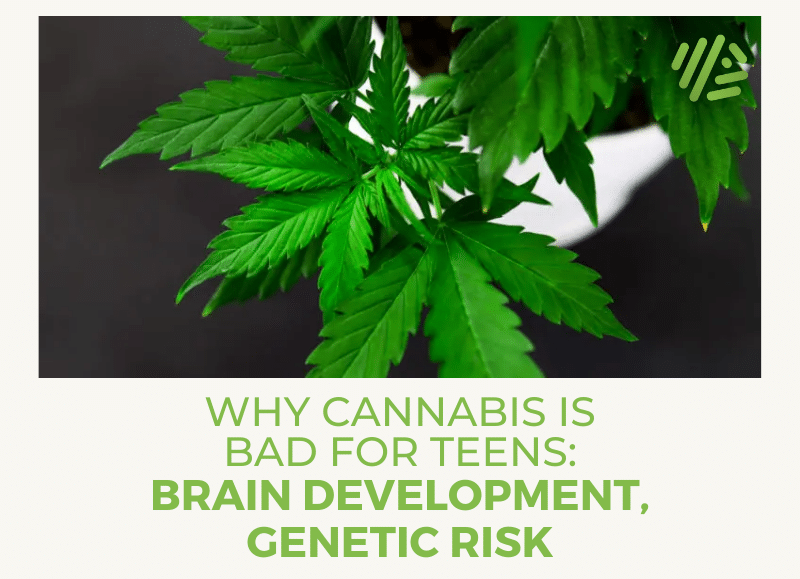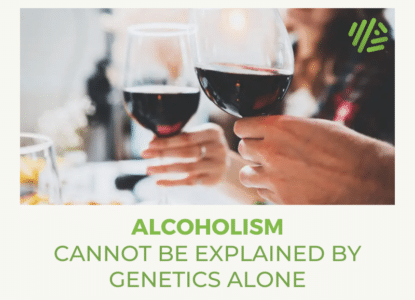Cannabis is Bad for Teenage Brains – These Genes Increase Risk
Article at a Glance
- New research in rats provides insight into how using THC can alter brain development in teenagers.
Genes Mentioned

Cannabis products have been marketed as harmless alternatives to alcohol that can even offer medicinal benefits, but the risks get lost in all the marketing.
If you have a teenager, it is important to:
- Educate them on the impact of cannabis on the developing brain.
- Understand how genetics can increase risk.
The use of products that contain high quantities of Δ9-tetrahydrocannabinol (THC), the main psychoactive ingredient produced by the Cannabis plant, is rapidly increasing in the adolescent population. At the same time, new research tells us that such exposure increases the risk of developing mental health disorders, leading to the onset of depression, psychotic symptoms, and the recently defined psychiatric disorder known as cannabis use disorder.1
In addition to this, noteworthy evidence is coming to light which shows that smoking weed causes profound effects on the development of the adolescent brain. Using an adolescent rat model, some interesting conclusions were drawn.
How does “weed smoking” affect brain development in teens?
In a teenager, the prefrontal cortex is still maturing and is not fully developed until about age 20-25. This is why using chemicals that constantly stimulate signaling in the brain may affect neurological development as the teen grows.
Kuei Tseng, a neuroscientist from the University of Illinois, has studied adolescent changes in the brain of rats for over 20 years.
In one of his studies, teenage lab rats, about 30 to 50 days old, were injected with THC. Rodents who were “high” during adolescence in the experiment showed poor learning that lasted long into adulthood. In these experiments, a rat will hear a buzzer and receive a mild electrical pulse. When the rat hears the buzzer again, it freezes up, anticipating the pulse. After a few instances of a buzzer but no shock, the rat will “learn” and stop freezing up. The adult rats who were given THC as adolescents were put through the experiment and what Tseng observed was that when they heard the buzzer, they constantly froze in the absence of any shock.2
Tseng concluded that the rats’ adolescent brains were impaired by cannabis and did not develop to their full potential in adulthood, preventing them from learning simple lessons-they couldn’t process the new information.
Another factor not mentioned in this study that can influence the effects of THC is the level of exposure.
Cannabis users who smoke or vaporize the drug are exposed to higher concentrations of THC. The same is true of edibles, which take longer to metabolize and have lower bioavailability, but often come in doses in excess of 50mg.
Avoiding “mega doses” is particularly important for adolescents who are vulnerable to the negative effects of cannabis due to ongoing brain development.
Genes that play a role in how cannabis impacts the teenage brain
Genetic differences in the dopaminergic system (dopamine signaling) may interact with cannabis use to increase the risk for the development of psychosis.
THC is the main component of the hemp plant or marijuana (Cannabis sativa L. [Cannabaceae]). The extent of the effects of THC can vary widely from person to person. One reason for this variability is that genes can influence how the body processes and responds to THC. This is because the way THC is metabolized depends on specific enzymes, which can vary in their activity levels based on genetics.
The genes listed below have been identified by our research team as important for flagging those at higher risk for cannabis-induced psychosis.
AKT1
The Protein Kinase B family, which consists of three serine/threonine kinases (AKT1, 2, and 3), is an integral part of dopaminergic signaling. Variations or SNPs in the AKT1 gene specifically have been associated with schizophrenia in several studies.3
Two recent studies looking at roughly 450 patients each show that patients who possessed the SNP had an increased likelihood of developing a psychotic disorder if they had a history of cannabis use.4,5
The endocannabinoid (eCB) system
The eCB system is a signaling system made up of receptors (CB1, CB2), protein (anandamide and 2-AG: 2-Arachidonoylglycerol), and enzymes (Fatty Acid Amide Hydrolase (FAAH) and Monoacylglycerol lipase (MAGL)), which are responsible for the degradation and reuptake of eCBs. These all play a role in regulating your physical and mental response to THC.
The “cannabinoid” hypothesis of schizophrenia is based on the fact that eCB over-activity may contribute to the development of schizophrenia, so this has prompted scientists to start looking at how weed affects psychosis.
A study published in the Journal of Neuroscience found that people with a particular SNP of the gene that codes for the enzyme responsible for metabolizing THC, known as FAAH had a stronger response to the drug, including greater feelings of subjective high and increased heart rate. This suggests that genetics plays a role in determining the severity of THC’s effects on the body.
CNR1
The CNR1 gene affects the structure and function of the CB1 gene. Numerous SNPs have been identified within the CNR1 gene, and their effects on drug consumption patterns and effects have also been studied.
A research study that followed 88 adolescents over 13 years discovered that the presence of a specific SNP significantly increased the level of cannabis use and that the more of these SNPs that were present additively increased cannabis usage.6 One recent investigation discovered that rs1049353 T-allele carriers show a much lower state satisfaction following THC exposure compared to CC individuals, possibly suggesting different subjective effects that result in the individual craving for additional cannabis.7
OPRM1
The mu-opioid receptor (MOR) that is encoded by the OPRM1 gene plays a role in the rewarding properties of many psychoactive drugs and is an important target in the treatment of addictions. In a recent study, fifty-two healthy regular cannabis users were tested for variations in their OPRM1 gene and their resulting blood levels of THC.8 Out of three investigated SNPs, the rs510769 T-allele was associated with increased positive responses to cannabis and higher blood THC levels compared to C-allele homozygotes, indicating that individuals with this allele have more intense responses to weed smoking.
Conclusion
Marketing and investment money from the business community has masked many of the risks for cannabis users, especially among teenagers whose brains are still developing.
Many studies have shown that frequent cannabis use during adolescence can impair cognitive function, increase the risk of mental health disorders, and affect brain structure and connectivity.
It’s still unclear whether genetics plays a role in determining the long-term effects of cannabis on the brain, but it’s possible that individual differences in how the body processes THC could contribute to these effects.
Overall, the science behind cannabis and genetics is still emerging, and further research is needed to fully understand how these two factors interact. However, the evidence suggests that genetics can have a significant impact on the way individuals respond to cannabis, highlighting the need for personalized approaches to drug use prevention and treatment.



